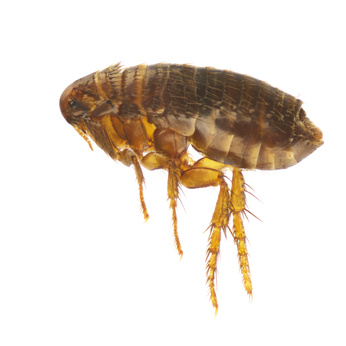Flea Pest Control, Extermination & Advice
Predator Pest Solutions are specialists in treating flea infestations. If you would like a free no obligation quote, please call us on 0800 112 3480 or fill in the form on the right.
Information On Fleas
There are numerous species of flea, but the most frequent infestations are caused by those relating to birds, cats or dogs. These flea species can easily cross over to humans or other warm bloodied animals including: mice, rats, squirrels, rabbits and foxes. Fleas are small parasitic insects, with a darkish red or brown colouring and no wings. Their bodies are narrow and they have strong hind legs, purposely built to allow them to move easily between the hairs or feathers of its host, and to jump from one animal to another.
 A flea can jump extremely long distances when compared to its size. Their tough bodies are designed to resist the scratching or biting of their host, making it difficult to destroy and allowing an infestation to increase rapidly. Fleas will pierce the skin of their host with their long, fine proboscis, to feed on their blood and although they will lay their eggs on the host’s body, these will mainly fall off into carpets, a pet’s blanket or another suitable location to hatch. Although your pet may have numerous fleas or eggs on its body, there are likely to be many more within the fabric of your home.
A flea can jump extremely long distances when compared to its size. Their tough bodies are designed to resist the scratching or biting of their host, making it difficult to destroy and allowing an infestation to increase rapidly. Fleas will pierce the skin of their host with their long, fine proboscis, to feed on their blood and although they will lay their eggs on the host’s body, these will mainly fall off into carpets, a pet’s blanket or another suitable location to hatch. Although your pet may have numerous fleas or eggs on its body, there are likely to be many more within the fabric of your home.
Flea Infestation & Risks
Pets are the most common source of a household flea infestation and it is difficult to prevent them experiencing a flea infestation at some time. However, homes without pets can just as easily become infested, due to a flea’s ability to move from host to host and the ideal breeding conditions found within most homes and offices.
There are four life stages for the flea: egg, larvae, pupae and adult. The eggs are a whitish colour, oval shaped and smooth. They are usually laid in batches and hatch into the larvae within 14 days. The larvae will feed on any organic matter around them, such as dead skin, faeces or the bodies of other insects, before moving on to the pupae stage. The pupae will usually remain cocooned for a week or two before emerging as an adult flea, but can wait up to 1 year or more for a suitable host to be in the vicinity, before emerging. This allows the flea to achieve its primary objectives, to feed and breed as quickly as possible.
 Due to their colour and size, fleas are difficult to see with the naked eye, so the first indication of a flea infestation may be when you observe your pet scratching or biting itself more than usual, or you are bitten yourself.
Due to their colour and size, fleas are difficult to see with the naked eye, so the first indication of a flea infestation may be when you observe your pet scratching or biting itself more than usual, or you are bitten yourself.
In the UK, fleas are generally believed to present a low risk of transferring a disease to humans, but their bite can cause an allergic reaction which can develop into eczema. Flea bites are most common around the legs and ankles of humans and are normally felt immediately, producing a dark and swollen itchy spot surrounded by a reddened area. There can be clusters of bites, or 2-3 bites in a row.
Flea Pest Control
To eliminate a flea infestation, you should regularly treat both your pets and property simultaneously. Although there are many ‘over the counter’ flea treatments available, it is sensible to seek veterinary advice before commencing any treatment, as the treatment can be dependent on the animal involved and be harmful to others.
The treatment for your property is normally by the use of a HSE approved insecticide spray, which should be applied around the affected and adjoining areas, driving the fleas from their hiding places and killing off the infestation. All our flea treatments are HSE approved and it is safe to return to and use the rooms that have been treated after a few hours. If you have pets, keep them out of the affected area for at least 24 hours.
In most situations it normally takes up to 60 minutes for our technician to complete their risk assessment, the required treatment and to brief the customer on the actions taken and next steps, but this can be extended if the infestation is in numerous areas or other hazardous conditions exist. The areas treated should not be cleaned or vacuumed for 14 days.
Once completed, the infestation should start to die off, but our technician can return after 14 days if the infestation requires a further visit to your property. Some flea infestations, especially those in commercial or multi-occupancy buildings may require additional visits to eradicate all activity.
If you have a flea infestation:
- Regularly treat any pets with a veterinary recommended flea treatment.
- Regularly shampoo or spray your carpets and furniture with a suitable cleaning product or disinfectant.
- Remove, hot wash or dry clean all curtains, bedding and other loose coverings.
- Hot wash or dry clean any clothing that has come into contact with the infestation.
- Carefully check, clean & clear the rooms of any other personal or valuable belongings before storing them away.
- Vacuum and clean all affected areas, then throw the waste away in an external bin.
- Ensure the edges of the rooms and any storage areas to be treated are accessible.
- Call Predator Pest Solutions on Freephone 0800 112 3480.
On arrival, our technician will:
- Establish the location and size of the flea infestation.
- Determine the most appropriate method to treat.
- Brief the customer on their findings and recommended next steps.
- Ensure the safety of others & protect any food preparation areas.
- Wear their protective equipment and commence with the treatment.
- Determine the correct and optimum locations for any surface insecticide and deploy with minimum impact to the customer.
- If required, implement a regular monitoring regime and maintain a site plan of the locations treated.
- Ensure the area is left safe and provide a written report.














